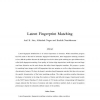Free Online Productivity Tools
i2Speak
i2Symbol
i2OCR
iTex2Img
iWeb2Print
iWeb2Shot
i2Type
iPdf2Split
iPdf2Merge
i2Bopomofo
i2Arabic
i2Style
i2Image
i2PDF
iLatex2Rtf
Sci2ools
111
click to vote
PAMI
2011
2011
Latent Fingerprint Matching
Latent fingerprint identification is of critical importance in forensics. While tremendous progress has been made in the field of automatic fingerprint identification, latent fingerprint matching continues to be a difficult problem because the challenges involved in latent print matching are quite different from rolled (full) fingerprint matching. Poor quality of friction ridge impressions, small finger area and large non-linear distortion are the main factors that affect latent fingerprint matchers. We propose a system for matching latent images with full fingerprints that uses minutiae as well as ridge information as the discriminative features. We have developed a minutiae-based fingerprint matcher that takes into account the specific characteristics of the latent matching problem. The ridge correlation matcher determines the degree of similarity in the ridge flow patterns of latents and full-print images. Experimental results on the NIST Special Database-27 which con...
Related Content
| Added | 14 May 2011 |
| Updated | 14 May 2011 |
| Type | Journal |
| Year | 2011 |
| Where | PAMI |
| Authors | Anil K. Jain, Jianjiang Feng |
Comments (0)

